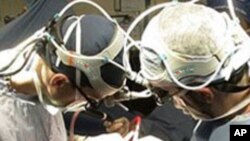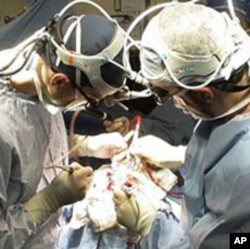A new study highlights the value of treating epilepsy patients with brain surgery if they don't improve with anti-epilepsy drugs. Patients who had surgery soon after the drugs proved ineffective usually stopped having seizures.
The study involved patients who had a form of epilepsy - mesial temporal lobe epilepsy, or MTLE - that commonly resists drug treatment. Surgery is an alternative; in fact, it's been used for more than 100 years.
But according to the head of the Seizure Disorder Center at the University of California Los Angeles (UCLA), most epilepsy patients who are not helped by medicine don't have surgery, or they wait years before they try it.
"The sad fact is that those patients who are referred for surgery today - those few patients who are referred - are referred an average of 22 years after the onset of their epilepsy. And by this time it's just too late to make a difference in their lives."
Jerome Engel, Jr., is the lead author of a new study of patients who had surgery within two years after it became apparent that drugs alone weren't working.
"If you operate on patients, then 85 percent in this study were seizure-free," Engel said. "And none of the patients who just continued to have medical care were seizure-free. And there was a statistically significant improvement in quality of life among those patients who had surgery" compared to those who took anti-epilepsy drugs.
Memory impairment is sometimes a side effect of this surgery - which, after all, involves cutting out part of the brain. But this study was too small to be conclusive on that question. Engel says, however, that if surgery did have an impact on memory, it was outweighed by improvements in quality of life related to being seizure-free.
Engel says he hopes the results of this study will encourage doctors to consider surgery as a treatment option.
"We're hoping to use the study to publicize the fact that there should not be a delay in referring patients. But not only that, the patients who continue to have seizures are at risk for all kinds of problems in the future including, as I said, premature death."
Engel says only about one percent of U.S. epilepsy patients who might benefit from surgery are referred to specialized epilepsy treatment centers. But the surgery is widely used around the world, he noted, citing the example of Brazil, where officials determined that it's more cost effective to surgically treat epilepsy than pay for the ongoing costs of seizures.






